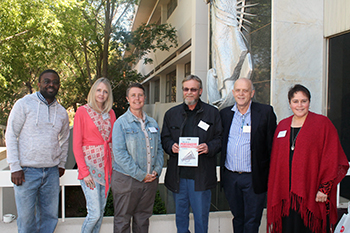Latest News Archive
Please select Category, Year, and then Month to display items
01 July 2021
|
Story Dikgapane Makhetha
|
Photo Supplied

This year, the young people of South Africa celebrated 45 years of the annual commemoration of
Youth Day. The University of the Free State (UFS)
Community Engagement (CE) office on the
Qwaqwa Campus has engaged a number of stakeholders in the call to use football as a means of bringing people together, transforming lives, and enthusing communities. Through partnerships, community organisations have great potential to create opportunities for breaking down barriers and inspiring social cohesion, initiating enablement through the development of social projects, and promoting education and health awareness.
On 16 June this year, local community organisations collaborated in the hosting of a soccer event for the youth of Qwaqwa at the FIFA Football for Hope Stadium in Tsheseng.
The Agape Foundation for Community Development,
Love Life,
Right to Care,
Youth in Action, Qwaqwa FIFA Project, and the Tsheseng Athletics Club were all stakeholders who diligently joined forces to ensure the successful launch of the tournament. Community development practitioners, who are trainees in the UFS Qwaqwa Department of Community Development, were garbed in departmental branded gear and have cautiously facilitated adherence to COVID-19 protocols. About 250 people, including football fans and participants, attended and enjoyed the entertaining games. Through the partnered recreational project, the Qwaqwa Campus CE office responded to the 2021 Youth Day theme: ‘Growing Youth Employment for an inclusive and transformed society’, by enhancing opportunities for networking among stakeholders. Football is popularly known for promoting transformational social projects in diverse communities across the globe.
International delegates attend SACOMM conference at UFS
2016-10-12

From the left: Prof Colin Chasi, Chairperson of the
South African Communications Association,
Dr Dalme Mulder UFS Lecturer; Dr Wilmien Marais,
UFS Lecturer; Prof Johann de Wet, former head of
UFS Department of Communication Science
Prof Tom O’Regan, University of Queensland (Australia)
and Prof Milli Rivera, Head of the UFS Department of
Communication Science during the conference on the
UFS Bloemfontein Campus.
Photo: Rulanzen Martin
Communication from within and below: Social Transformation and Inclusiveness. That was the theme of the 2016 South African Communication Association (SACOMM) conference, hosted at the Bloemfontein Campus of the University of the Free State (UFS) from 3 to 5 October 2016.
“Through this theme, participants were invited to submit papers that examined the role of communication in today’s tumultuous climate,” said Prof Mili Rivera, Head of the Department of Communication Science at the UFS.
A total of 140 delegates from other South African universities, as well as international delegates from Zimbabwe, Nigeria, the United Kingdom, United States, and Australia attended the conference. It was the second time in ten years that the UFS hosted the conference.
Organisation to mentor and support emerging scholars
Various staff members and students from the UFS Department of Communication Science presented papers during the three days.
Annette van Baalen and Dr Dalme Mulder, both lecturers in the department, won the best paper award in the Corporate Communication division. A number of emerging scholars also presented papers. “The organisation is committed to mentoring and supporting emerging scholars in the field of Communication Science,” said Prof Rivera.
Association must be agent of change in curriculum
Delegates discussed the role of the organisation (SACOMM) as an agent of change in terms of decolonising the curriculum. The focus was on training journalists to cover crises in a fair and balanced manner. The book The Art of Persuasive Communication - A Process (4th Edition) by Prof Johann de Wet, former head of the UFS Department of Communication Science, was also launched during the conference.
The next SACOMM conference will take place at Rhodes University in 2017.